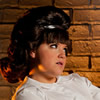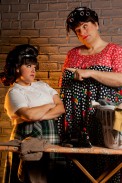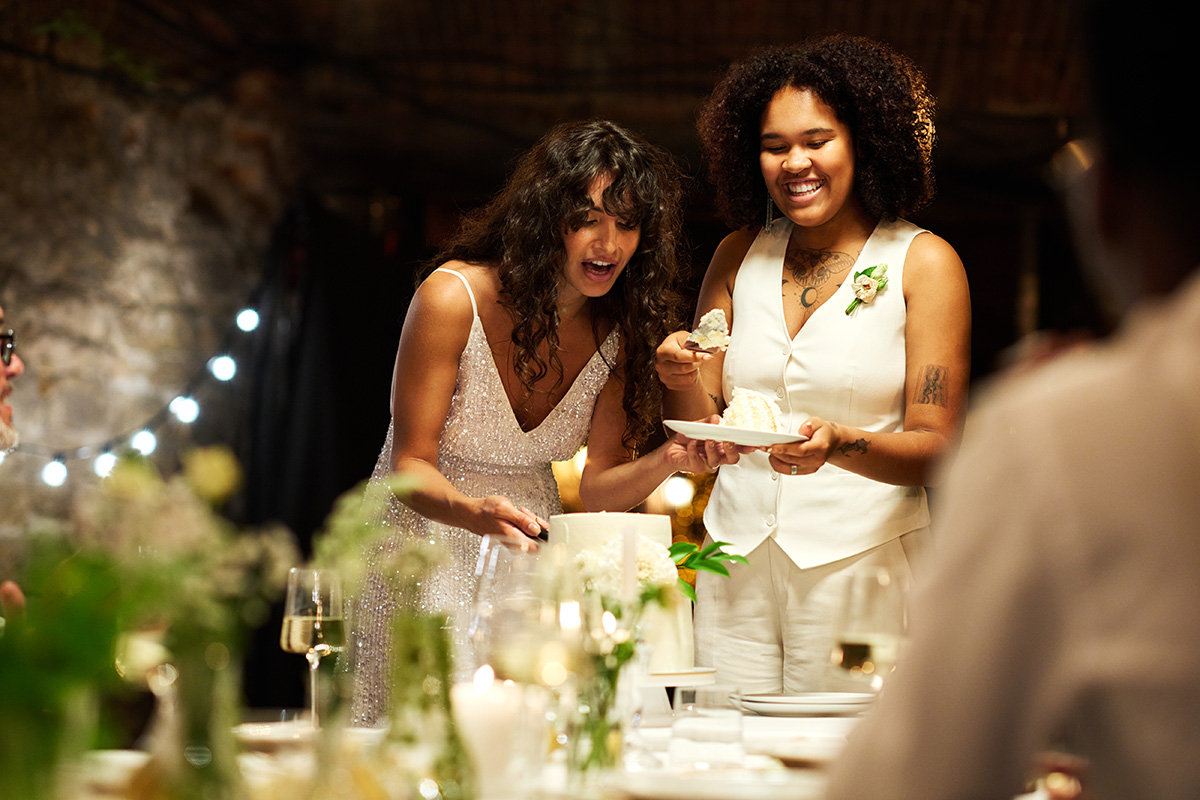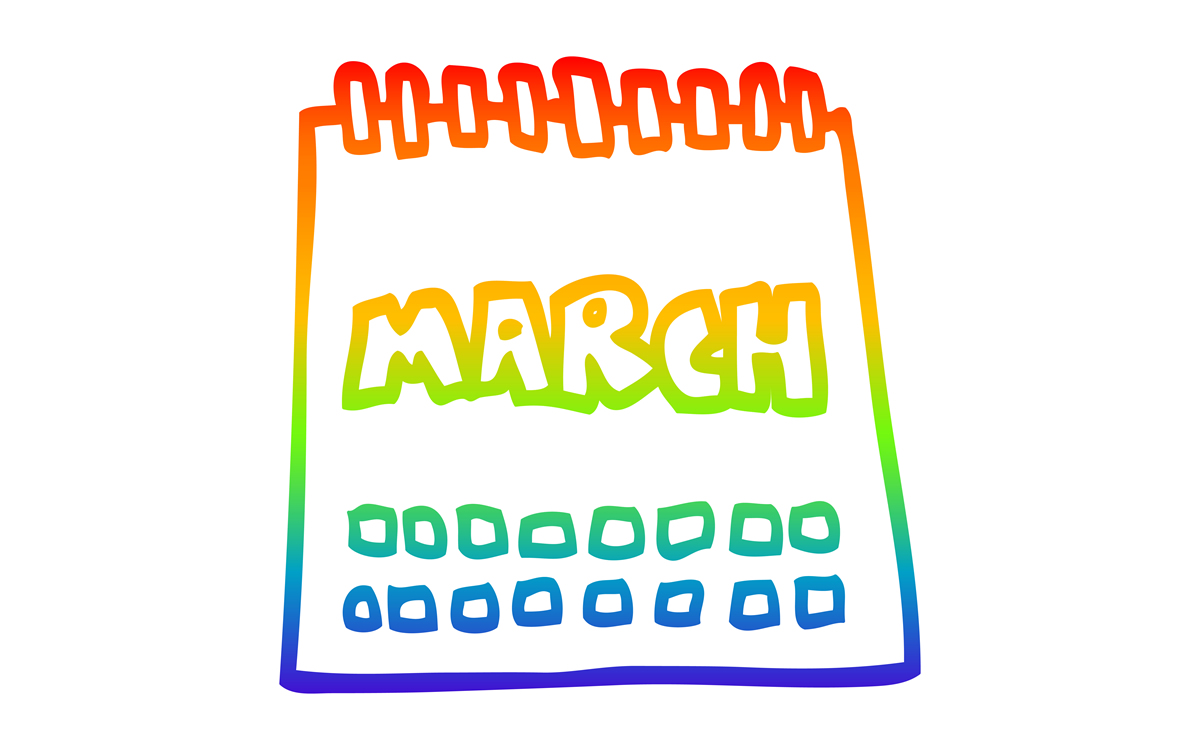Arts & Entertainment
Arts news in brief: Nov. 18
‘Hairspray’ at Signature, Thanksgiving volunteer opps and more


Robert Aubry Davis and Carolyn Cole star in Signature Theatre's production of ‘Hairspray’ opening Monday. (Photo by Christopher Mueller; courtesy Signature)
‘Hairspray’ at Signature
Signature Theatre’s production of ‘Hairspray’ opens Monday. The musical will star radio host Robert Aubry Davis as Edna Turnblad, Carolyn Cole as Tracy Turnblad and Patrick Thomas Cragin as Link Larkin.
Performances will run Tuesday through Sunday evenings, expect Thanksgiving, after the Monday night opening, with matinees on Saturdays and Sundays.
Tickets range from $62 to $86 and can be purchased online at ticketmaster.com.
The show runs through Jan. 29.
Capital Queer Prom hosts meet and greet
The Capital Queer Prom Committee is having its official “Meet and Greet” happy hour on Tuesday at Hank’s Oyster Bar (1624 Q St., N.W.) from 6:30 to 8 p.m.
At the event, attendees will be able to mix and mingle with members from the committee as well as learn about Transgender Health Empowerment, this year’s prom beneficiary. They will also be the first to know about announcements, early bird tickets and how to sign-up to be Prom King or Queen.
There will also be spiked bunch and free appetizer platters and drink specials running until 7:30 p.m.
Tickets are $10 and the funds will benefit Capital Queer Prom and T.H.E. The sixth annual Capital Queer Prom will be held March 24. For more information, visit capitalqueerprom.com.
Thanksgiving brings volunteer opps
With Thanksgiving coming up next week, there are plenty of opportunities to volunteer and help the community.
Food & Friends (219 Riggs Rd., N.E.), an organization that provides meals for people living with HIV/AIDS, cancer and other life-challenging illnesses, has a couple different opportunities for people to help this Thanksgiving.
From Monday to Wednesday, volunteers will be needed to help with turkey box deliveries. These are boxes put together for clients who live further away and need the delivery sooner to make their Thanksgiving dinner. Volunteers will also be needed to assist with food preparation and packing groceries in two hour shifts at 8 and 10 a.m., and 1 and 5 p.m.
On Tuesday, volunteers are needed to help with “Slice of Life,” a program where people can buy pies for themselves or clients and each pie bought equals one day of meals. People will be needed to set up pie distribution and assist customers as they arrive with shifts from 10:30 a.m. to 8 p.m.
On Thanksgiving, volunteers will be needed to deliver holiday meals to two or three clients in the D.C. area during one of four delivery shifts at 7:30, 9 and 10:30 a.m. and noon. The organization also needs volunteers to assemble the meals and to help with the logistics of the day.
For more information about volunteering for Good & Friends, visit foodandfriends.org.
The Washington Renegades gay rugby team will be helping out Food & Friends on Sunday from 9 a.m. to 1 p.m. as an annual event.
The team will be prepping turkeys, chopping vegetables and packing bags of prepared food. After volunteering the group will be having a gathering.
Burgundy Crescent Volunteers has some opportunities to volunteer as well. Besides helping with Food & Friends, the organization will be holding its ninth annual “Clear OUT Your Closets” clothing drive for the homeless at Rosemary’s Thyme (1801 18th St., N.W.) with donation drop-off running from 10 a.m. to noon.
The group also needs volunteers to help with providing Thanksgiving dinner for the homeless and needy at Rosemary’s Thyme from noon to 2 p.m. Volunteers are needed to help set up starting at 10:30 a.m., clean up after and bring a dish of some kind to serve.
For more information about volunteering with Burgundy Crescent, visitburgundycrescent.org.
Out & About
Plan your wedding the LGBTQ way
Washington D.C. LGBTQ+ Wedding Expo scheduled for Sunday

Rainbow Wedding Network will host “Washington D.C. LGBTQ+ Wedding Expo” on Sunday, March 1 at 12:30 p.m.
Guests can meet and mingle with a curated selection of LGBTQ-welcoming wedding professionals from across the region, each ready to help bring your vision to life, and spend a beautiful afternoon exploring everything they need to create a celebration that reflects them.
There will be a relaxed, self-guided look at the Watergate’s spaces and amenities, savor signature cocktails and delicious tasting samples, and connect with other couples who are on the same journey.
Visit Eventbrite to reserve a spot.

Friday, February 27
Center Aging Monthly Luncheon With Yoga and Drag Bingo will be at 12 p.m. at the DC Center for the LGBT Community. Email Mac at [email protected] if you require ASL interpreter assistance, have any dietary restrictions, or questions about this event.
Go Gay DC will host “LGBTQ+ Community Happy Hour Meetup” at 7 p.m. at Freddie’s Beach Bar and Restaurant. This is a chance to relax, make new friends, and enjoy happy hour specials at this classic retro venue. Attendance is free and more details are available on Eventbrite.
Trans Discussion Group will be at 7 p.m. on Zoom. This group is intended to provide an emotionally and physically safe space for trans people and those who may be questioning their gender identity/expression to join together in community and learn from one another. For more details, email [email protected].
Saturday, February 28
Go Gay DC will host “LGBTQ+ Community Brunch” at 11 a.m. at Freddie’s Beach Bar & Restaurant. This fun weekly event brings the DMV area LGBTQ+ community, including allies, together for delicious food and conversation. Attendance is free and more details are available on Eventbrite.
The DC Center for the LGBT Community will host “Sunday Supper on Saturday” at 2 p.m. It’s more than just an event; it’s an opportunity to step away from the busyness of life and invest in something meaningful, and enjoy delicious food, genuine laughter, and conversations that spark connection and inspiration. For more details, visit the Center’s website.
Black Lesbian Support Group will be at 1 p.m. on Zoom. This is a peer-led support group devoted to the joys and challenges of being a Black lesbian. You do not need to be a member of the Beta Kappa Chapter or the Beta Phi Omega Sorority in order to join, but they do ask that you either identify as a lesbian or are questioning that aspect of your identity.Send an email to [email protected] to receive the zoom link.
Sunday, March 1
LGBTQ+ Community Coffee and Conversation will be at 12 p.m. at As You Are. This event is for people looking to make more friends and meaningful connections in the LGBTQ community. Attendance is free and more details are available on Eventbrite.
Monday, March 2
“Center Aging: Monday Coffee Klatch” will be at 10 a.m. on Zoom. This is a social hour for older LGBTQ+ adults. Guests are encouraged to bring a beverage of choice. For more information, contact Adam ([email protected]).
Tuesday, March 3
Universal Pride Meeting will be at 7 p.m. on Zoom. This group seeks to support, educate, empower, and create change for people with disabilities. For more details, email [email protected].
Wednesday, March 4
Job Club will be at 6 p.m. on Zoom upon request. This is a weekly job support program to help job entrants and seekers, including the long-term unemployed, improve self-confidence, motivation, resilience and productivity for effective job searches and networking — allowing participants to move away from being merely “applicants” toward being “candidates.” For more information, email [email protected] or visit www.thedccenter.org/careers.
Center Aging Women’s Social and Discussion Group will be at 6 p.m. on Zoom. This group is a place where older LGBTQ+ women can meet and socialize with one another. There will be discussion, activities, and a chance for guests to share what they want future events to include. For more information, email [email protected].
Thursday, March 5
The DC Center’s Fresh Produce Program will be held all day at the DC Center for the LGBT Community. People will be informed on Wednesday at 5 p.m. if they are picked to receive a produce box. No proof of residency or income is required. For more information, email [email protected] or call 202-682-2245.
Virtual Yoga Class will be at 7 p.m. on Zoom. This free weekly class is a combination of yoga, breathwork and meditation that allows LGBTQ+ community members to continue their healing journey with somatic and mindfulness practices. For more details, visit the DC Center’s website.
a&e features
Transmission DC breathes new life into a storied sound space
A fresh home for boundary-pushing culture on H Street

Late last year, phoenix-style, a fresh home for boundary-pushing culture arose on the H Street corridor. Transmission DC – a queer, trans, and POC-owned, operated, and centered community-focused venue – powered on in the former home to the Rock & Roll Hotel (famously, not a hotel, but very much rock & roll). Transmission (1353 H St., N.E.) arrives secure in its mandate – or even birthright – to provide a place to celebrate creativity and music through a lens of inclusivity and respect.
Transmission’s team brings experience, but also representation. Owners/partners Kabir Khanna (who is also programming director), Katii B, Ellie McDyre, and Kelli Kerrigan together previously managed 618 productions, a venue in Chinatown, crafting “some of D.C.’s freakiest parties, raves, and mosh pits” they note.
They packed up operations last fall to a space curated specifically for D.C.’s underground music and culture scene, building their efforts in Chinatown to bring in more fans in queer and POC circles.
Transmission, Khanna points out, is built on DIY values. In the music scene, DIY means that promoters and organizers – often disconnected from the mainstream and part of marginalized communities – build shows and programs collaboratively, but independently from institutions, supporting each other as smaller, independent venues close. Here, Transmission aims to ensure that those putting together these underground inclusive shows have a more permanent and stable home, can have access to resources, and can provide more sustainable income to artists. “We’re trying to get more people to support and enjoy the music, and also give artists and organizers within the DIY community more structure and a larger cut,” says Khanna.
Khanna also notes that Transmission operates “under the principles of safety, inclusivity, and respect.” McDyre added that even at venues that claim inclusivity, that statement might not take place in practice. We’re “not just pitting up a rainbow flag,” says McDyre, but as some of the owners are trans and POC, audiences can see themselves reflected at the top.
Much like the DIY nature of the music community, the Transmission owners brought a DIY ethos to turning around their space.
In March 2020 – the height of COVID lockdowns – Rock & Roll Hotel suddenly shuttered, though not due to the pandemic; instead, the venue claimed that decreasing sales and increasing competition led to the closure. For 14 years, it was the central spot for cheap beer and lesser-known and celebrated acts. The space stood vacant for more than five years, until Transmission turned the power back on.
“When we got into the space, it was effectively abandoned for years,” says Khanna. “There was a ton of mold, and paint primer covering all surfaces. It was nearly falling apart.” Khanna noted that many music venues like this one, regardless of how well it was maintained, “get the shit kicked out of it,” given the nature of shows. The team called in mold removal contractors, ripped up most of the floorboards, and started fresh.
Transmission’s first floor is styled as a stripped-down black box: the better to take in the music. “It’s minimal on purpose to act as a canvas for set design and music,” without a specific aesthetic, says Khanna. Moving upstairs, the second floor has been opened up, removing some walls, and now has a larger dance area than the first floor. Beyond the first two performance levels, and a holdover from Rock & Roll Hotel, is the rooftop. Though without a stage, the rooftop space is filled with murals splashed across the walls, with a full bar. Transmission’s current capacity is 496, but the team is looking to grow that number. Transmission will also leverage the full kitchen that Rock & Roll Hotel operated, bringing in Third Hand Kitchen to offer a variety of food, including vegan and vegetarian options.
Khanna pointed out an upcoming show reflective of Transmission’s inclusive ethos: Black Techo Matters on Feb. 27. The event is set to be “a dynamic, collaborative night of underground electronic music celebrating Black History Month.” Khanna says that techno came from Black music origins, and this event will celebrate this genesis with a host of artists, including DJ Stingray 313, Carlos Souffront, and Femanyst.
-

 Mexico5 days ago
Mexico5 days agoUS Embassy in Mexico issues shelter in place order for Puerto Vallarta
-

 Netherlands4 days ago
Netherlands4 days agoRob Jetten becomes first gay Dutch prime minister
-

 Sports4 days ago
Sports4 days agoMore than a dozen LGBTQ athletes medal at Olympics
-

 Books3 days ago
Books3 days agoNew book profiles LGBTQ Ukrainians, documents war experiences




















